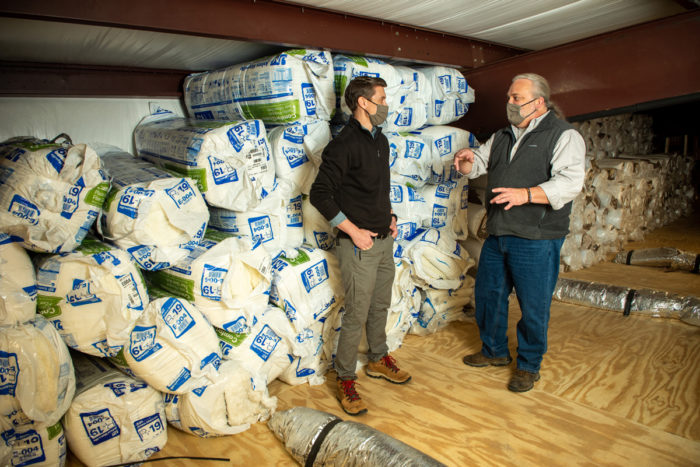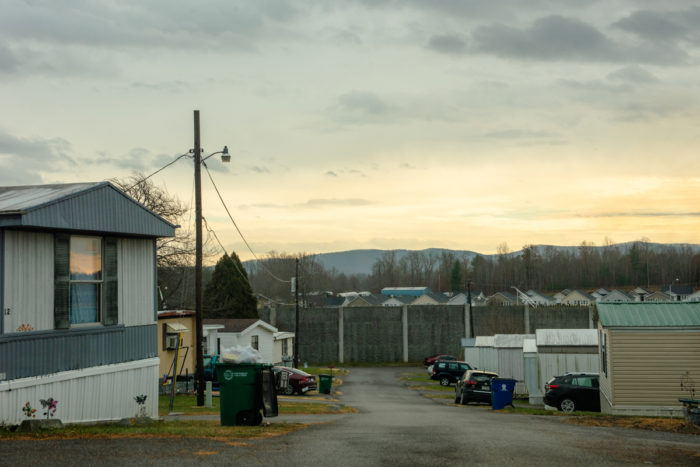“Weatherization corrects environmental injustices”: Virginians are solving energy problems thanks to RGGI money
When Chase Counts was a college student at Virginia Tech, he dreamed of developing a sustainable energy resource that would save the world.
A few counties away, Brett Hood had a vision, too: he wanted his construction business to serve working class people, instead of the well-to-do clients that his business relied on to pay the bills.
By weatherizing under-resourced families’ homes, both men have made their idealistic dreams come true.
“Being able to help people who are low-income and fighting the poverty line every day, people sometimes in very desperate situations — it’s amazing to finally help,” says Hood.

Efficiency upgrades
As part of the Energy Solutions team at an organization based in Christiansburg, Virignia called Community Housing Partners, Counts and Hood cut families’ utility bills by driving down how much energy they need to use in the first place. They improve the ventilation, insulation, moisture control and air leakage in people’s homes to make them more efficient — a simple strategy that yields big dividends.
“Weatherization helps correct environmental injustices and saves folks money on their utility expenses. It improves the indoor environmental quality of their home, their health and safety, makes them proud of their home and their community. There are so many benefits,” explains Counts.
But until Virginia began participating in the Regional Greenhouse Gas Initiative last year, there were a lot of families Community Housing Partners had to turn away.
The Regional Greenhouse Gas Initiative, known as “Reggie” from its acronym RGGI, is a successful program to reduce pollution that directly helps Virginians like the ones Counts and Hood serve. Utilities in Virginia have to buy an allowance for every ton of carbon dioxide that comes out of their power plants. Virginia invests the money it receives from the sale of the allowances in flood resilience — and energy efficiency measures.
All of the energy efficiency funds go directly to help low-wealth households like Community Housing Partners’ clients. Before RGGI funding was available, Community Housing Partners served nearly 7,000 households every year. For the first year of RGGI funding, Counts and Hood anticipate being able to unlock the weatherization potential for nearly 2,000 additional households.
Weatherization specialist Chase Counts examines the AC unit for a homeowner making upgrades to improve their home’s energy efficiency.
Proper thermostat settings, or a programmable thermostat, are one easy way to help cut home energy use. Here Chase Counts reviews the settings for a customer in Christiansburg, Virginia.
But it’s not only a question of scale: RGGI funding also changes who Counts and Hood are able to serve.
Lower utility bills make the biggest difference for people on the tightest incomes. But families with the tightest incomes are often those who live in houses that are in the roughest shape. That means many of the families that would most benefit from cutting their utility bills are often ineligible for energy efficiency improvements, because the housing they live in is not in any condition to be weatherized.
“If a roof is leaking, we can’t put insulation in the attic,” says Hood. “It was heartbreaking to tell people, ‘I’m sorry, we can’t make the repairs you need until funds magically appear.’ But with RGGI money — they appeared.”
Thanks to Virginia’s participation in RGGI, the first fiscal year of the program alone devoted $15.2 million to helping families make the repairs they need to receive weatherization services.
Weatherization is one of the most impactful programs I’ve ever seen to help lower-income people…It’s helping across the board by freeing up resources for food, childcare, medication — just helping level the playing field for those that need it most.
Brett Hood, Community Housing Partners
Counts and Hood are actively contacting clients whom they previously had to turn away to tell them they are able to make the repairs their homes needed — and then weatherize them, too.
“We’ve worked with clients whose homes’ disrepair has made them so anxious that people say they can’t sleep at night. We’ve had clients tell us they’re afraid to turn on their HVAC system or water heater because they’re so concerned their electric issues may cause a fire. People who don’t feel safe cooking in their home,” recalls Counts. “That’s what we’re alleviating with these funds.”
RGGI: A proven solution
Ten other states have been participating in RGGI for years, but since Virginia became the eleventh in 2021, Counts and Hood have already been putting Virginia’s weatherizing funds to work.
In just three months, they tackled an apartment complex in the Shenandoah Valley with 102 residents, repaired 25 single-family residences, and have 50 more families in the process of getting applications and approvals for repairs. They are currently scoping out work for several hundred more multi-family clients across the Commonwealth.

“Weatherization is one of the most impactful programs I’ve ever seen to help lower-income people,” says Hood. “It’s not just individuals: it’s helping across the board by freeing up resources for food, childcare, medication — just helping level the playing field for those that need it most.”
Virginia has long been a leader in the South, and programs like the ones deploying RGGI funds make it easy to see why.
“Our team and our clients are laying the foundation and groundwork for other states to see how we were able to deliver these repairs,” says Counts. “I’m hoping RGGI expands around the country so it’s available to more than just Virginia residents.”
